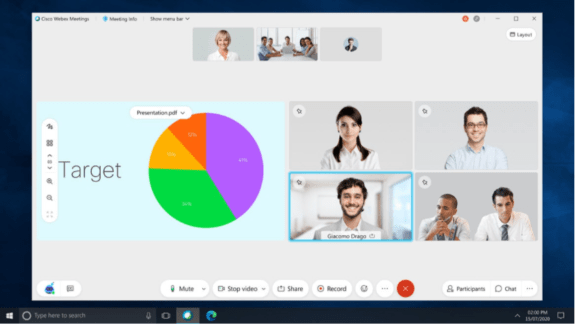April 28, 2022
For better or worse, depending on your take, remote work is here to stay. Maybe not across the board, but certainly to a far greater degree than in pre-pandemic days. With that in mind, leaders need to figure out (if they haven’t already) what works and what doesn’t when it comes to making their teams as productive as possible.
According to a recent Steelcase study, however, remote productivity is something of a conundrum in that it has both significantly improved and grown more challenging over the past couple of years. One way to make sure it’s most frequently in the former camp is management. Especially now that we’re all no longer face-to-face in offices day after day, effective leadership matters more than ever—and it often requires a different mindset.
“You need to up-level yourself as an executive,” Max Makeev, chief development officer at Owl Labs, told CIO.com. “Be approachable, human, and understanding. I think that requires change from within, at least for a lot of traditional executives with a facade they are trying to maintain. That approach won’t work long term. Employees have so many options now. They can easily find work that fits their values.”

Leadership Skills Might Not Transfer
First off, it’s important to stress that those who lead well in person, enhancing productivity in the process, aren’t necessarily as effective on a virtual level. In fact, it’s often the opposite case. Helming and inspiring a remote workforce takes a different set of skills, some of them rooted in traditional methods and some not.
“In face-to-face interactions, most of us are very easily swayed by the power of personality,” Radostina Purvanova, an associate professor of management and leadership at Drake University in Iowa, told the BBC. “Virtually, we are less swayed by someone’s personality and can more accurately assess whether or not they are actually engaging in important leadership behaviors. People are more likely to be seen based on what they actually do, not based on who they are.”
Remote leadership tips from experts interviewed by CIO.com ran the gamut from trusting employees are doing their work while also verifying that’s the case, to setting clear OKRs so people always know what’s expected of them output-wise. Discovering what workers find most meaningful about their jobs was also central, as were frequent (but non-intrusive) check-ins that didn’t disrupt flow. They also emphasized the celebration of accomplishments. (As Gartner research VP Brian Kropp noted last year, “During periods of disruption, employees’ desire for being recognized for their contribution increases by about 30 percent.”)
In a Forbes Business Council overview from late January, keys to leading a productive remote work team included everything from listening better and promoting employee wellness to being flexible about schedules and promoting worker autonomy.
Continue to Be Flexible
“As work has become more flexible, leadership needs to be flexible, too—but more than anything, it forces leaders to be better leaders,” one of the co-authors wrote. “I find that the leadership style that works best allows for individual team members to have greater flexibility. This really forces leaders to have clearer communication and alignment of priorities instead of relying on larger and one-to-one meetings to coordinate.”
Another observed, “We started managing more toward desired work output rather than work input such as day-to-day activities. Some managers struggled to shift to this approach since they were used to managing toward tasks. But shifting to clearer targets has fueled our growth, and the overall response from their employees has been that this new approach allows them to produce results in a way that suits their working style.”

As a Microsoft study noted, it’s important for managers to establish new guidelines so flexible working hours don’t morph into a never-ending workday. Employees that have a harder time shutting down may need more one-on-one guidance. But knowing which workers need what and when takes intensive communication and increased empathy.
“Workers are not islands,” said Microsoft principal researcher Shamsi Iqbal. “Right now you cannot assume that everyone on your team is going to be available during the 9-to-5 timeframe, or that others will want to collaborate when you’re working outside regular business hours…I think we need to reset the expectation and realize that most information, unless it’s urgent, can wait for a reply.”
And be careful not to play favorites, experts say, even if unconsciously. Just because someone isn’t in the office doesn’t mean they’re less valuable or dedicated. That’s a major mental shift for many leaders, but one that’s absolutely necessary.
“Leaders must design team interaction around inclusion—so that location is not a criteria for promotion or productivity,” business coach Chris Westfall wrote in Forbes. “How are you making sure that you connect with the folks on zoom as often as you do with the people in the office? For knowledge workers, work is not a function of location. For leaders, you function best when you create a team model that includes everyone, and empowers every employee (no matter where they are).”
Trust Your People
Another one of the most important components of effective remote work is trust. If leaders don’t trust their employees and vice versa, the whole system is weakened. That was true with the old in-office model and it’s triply so now. To that end it’s best (as ever) to avoid micromanaging and, as Gartner’s Kropp put it, “put utmost trust and confidence in your employees that they will do the right thing — which they will if employers provide a supportive structure.”
Not to be overly Disney-esque, but it’s a whole new world out there—one in which ongoing adaptation, frequent collaboration and effective communication are vital to the productivity and overall success of any team. The best leaders know this and have already pivoted.
The ones that haven’t, or won’t, are merely in the way.
Like what you read?
Contact us today to get help implementing a hybrid work policy.
About Mindsight
Mindsight is industry recognized for delivering secure IT solutions and thought leadership that address your infrastructure and communications needs. Our engineers are expert level only – and they’re known as the most respected and valued engineering team based in Chicago, serving emerging to enterprise organizations around the globe. That’s why clients trust Mindsight as an extension of their IT team.

